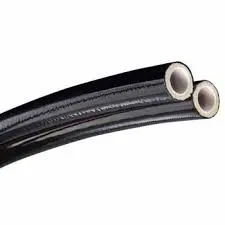Aug . 12, 2024 10:46 Back to list
China PTFE Hose Exporters Specializing in Plain Tubes for Global Markets and Applications
Exploring the Export Landscape of PTFE Hose Tubes from China
Polytetrafluoroethylene (PTFE) hose tubes have gained significant traction in the global market due to their exceptional properties, making them indispensable in various industries. As an exporter, China plays a crucial role in supplying PTFE hoses worldwide. This article delves into the qualities of PTFE hoses, their applications, and the dynamics of China's export market.
Understanding PTFE Hoses
PTFE is a high-performance thermoplastic known for its non-stick, chemical-resistant properties. PTFE hoses are manufactured using a process that entails extruding the material into hollow tubes, which are then reinforced, often with braided stainless steel or carbon fiber, to enhance strength and flexibility. These hoses can withstand extreme temperatures and pressures, making them suitable for demanding environments.
Key Applications of PTFE Hoses
1. Chemical Processing PTFE hoses are extensively used in the chemical industry due to their ability to resist a wide range of aggressive chemicals, including acids and solvents. This resilience ensures safe and efficient transport of hazardous materials, preventing leaks and contamination.
2. Food and Beverage In the food industry, PTFE hoses are preferred for their non-reactive properties, which help maintain the purity and taste of food products. Their smooth interior surface minimizes the risk of bacterial growth and facilitates easy cleaning.
3. Pharmaceuticals The pharmaceutical sector relies heavily on PTFE hoses for transferring sensitive and sterile materials. Their ability to withstand sterilization processes without degrading makes them ideal for this application.
4. Aerospace and Automotive The aerospace sector utilizes PTFE hoses for fuel and hydraulic systems, where performance under extreme conditions is critical. They are also employed in automotive applications, such as brake lines and fuel delivery systems, highlighting their versatility.
China’s Competitive Advantage in PTFE Hose Exports
china plain tube of ptfe hose exporter

China has emerged as a leading exporter of PTFE hose tubes, capitalizing on several key advantages
1. Manufacturing Capacity With advanced manufacturing technologies and capabilities, China can produce PTFE hoses at scale and maintain consistent quality. This capacity allows for faster production and delivery times, making Chinese exports attractive to international clients.
2. Cost-Effectiveness The relatively lower labor costs in China contribute to the competitive pricing of PTFE hoses. This affordability doesn’t compromise quality, enabling Chinese manufacturers to offer high-performance products at lower prices compared to those from other regions.
3. Robust Supply Chain China boasts a well-established supply chain that encompasses the entire production process, from raw materials to finished products. This integration not only enhances efficiency but also ensures timely delivery and responsiveness to market demands.
4. Global Reach Chinese exporters have established a strong presence in various international markets, building relationships with distributors and end-users. By attending global trade shows and investing in marketing strategies, they have succeeded in expanding their reach across different regions.
Challenges and Future Outlook
Despite its thriving export market, China faces challenges, including increasing competition from other countries and fluctuating raw material prices. Additionally, the need for compliance with international regulations poses hurdles for exporters.
However, the future of China’s PTFE hose export industry remains promising. With continuous advancements in manufacturing technologies and a growing emphasis on sustainability, Chinese exporters are likely to adapt and innovate, further solidifying their position in the global market.
In conclusion, the export of PTFE hose tubes from China represents a significant aspect of the global industrial supply chain. With their exceptional properties and wide-ranging applications, PTFE hoses are here to stay, and China will continue to be a key player in meeting the global demand for these essential components.
-
Best Four Steel Wire Spiral Hose Hydraulic R12 – Durable High-Pressure Hose Manufacturer
NewsJul.08,2025
-
High-Quality 1/4 Hydraulic Hose – Soft, Flexible & Durable Rubber Hoses for Industrial Use
NewsJul.08,2025
-
1 1 2 Inch Hydraulic Flexible Hose - Durable, Reliable, High-Pressure Solutions
NewsJul.07,2025
-
High-Quality 1 2 Rubber Hose - Durable, Flexible Hydraulic Solutions
NewsJul.07,2025
-
Discover SAE Hydraulic Hose Types - High Quality & Durable Hoses from Leading Factory Supplier
NewsJul.06,2025
-
High Pressure Wire Hydraulic Rubber Hose Supplier Durable & Reliable 1SN Hose Solutions
NewsJul.06,2025
